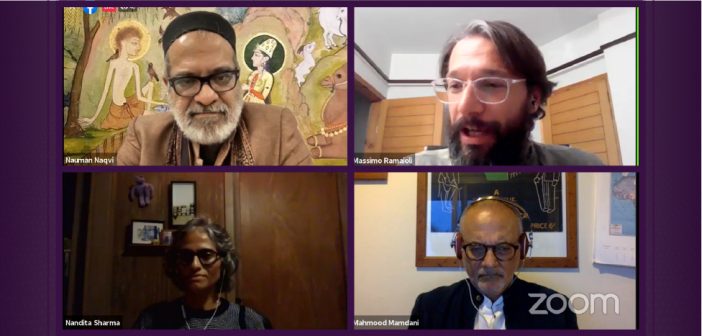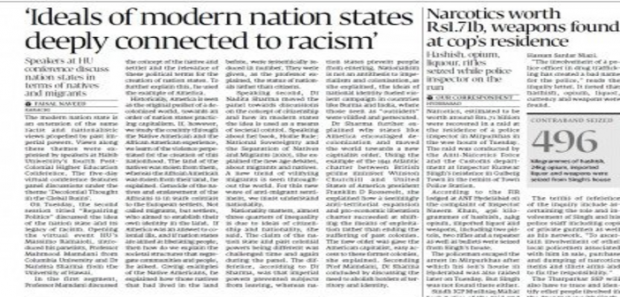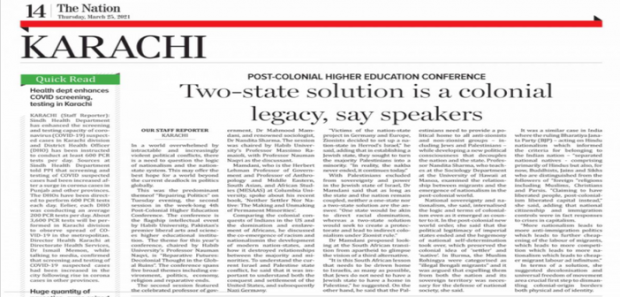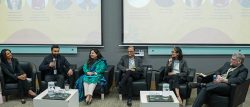The world is currently steeped in political conflicts due to the deep fractures caused by colonialism with conflicts such as the Israel-Palestine having no clear end in sight. However, a solution could be available on the horizon provided people are willing to first realize the socio-political constructs of nation-states they have been placed in and work on a new alternative that promotes alliance rather than distinction.
These themes were explored in the second session of Habib University’s fourth Post-colonial Higher Education Conference titled ‘Repairing Politics’. Dr Mahmoud Mamdani, a professor of Anthropology and Middle Eastern, South Asian, and African Studies at Columbia University, and Nandita Sharma, Professor of Sociology at the University of Hawaii, were the esteemed guests on the panel.
The session was chaired by Dr. Massimo Ramaioli, Assistant Dean of the School of Arts, Humanities and Social Sciences at Habib University, and included Dr. Nauman Naqvi, Associate Professor of Comparative Humanities at Habib University.
The session delved into the intractable problems of contemporary politics of the world, the formation of modern nation-states and how it is deeply rooted in both colonialism and racism. Both panelists offered an emancipatory image of how the new world order could and should look like.
Dr. Mamdani began with an overview of the key arguments in his book, ‘Neither Settler nor Native’, which centers on the nation-state and post-colonial modernity. He went on to explain that the liberal notion of the nation-state turned the majority and minority into permanent political identities. Only the majority had sovereignty, and the minority could not participate in the political process because they were not sovereign. The idea of a sovereign majority alongside a non-sovereign minority was the original sin in the liberal theory of the nation-state, he argued. In his book, Dr. Mamdani also explored the construction of an epistemological project that grounded the political distinction between sovereign and non-sovereign subjects in an epistemic and legal distinction.
He proceeded to ask what we can learn from the failure of the ‘Nazification in the relative success of post-apartheid South Africa. He takes a look at the last chapter of his book that views Israel-Palestine from a South-African lens. By taking the US as a case, he sought to compare the conquest of Indians and the domination of Africans to distinguish between colonial conquest and racial domination. He argued that these were two different modern strategies of subjugation, each with a different consequence.
Dr. Mamdani spoke about the different ways of thinking about political identity – one that is historical and changeable and the other being natural and permanent. He suggested decoupling the nation and the state as we seek an alternative to the nation-state.
Speaking about the difference between immigrants and settlers, he explained that immigrants are those that come to join existing polities, seeking equality or advantage in them, while settlers come to displace existing polities and establish their exclusive sovereignty. Indian reservations in the US, in particular, were not part of the sovereign state, he argued. Abraham Lincoln’s contribution in the second half of the 19th century was to establish a sovereign state alongside a non-sovereign state. He wished to provide a permanent solution to the Indians who had survived the genocide.
Watch the session
The latest version of the two-state solution, he said, is Israel-Palestine. By contrast, in South Africa, the native population was subordinated in a one-state solution which provided the political context for alliance-building to a general emancipatory struggle.
On the other hand, the two-state solution imposed isolation on an oppressed group by imposing on it a separate political home. This, he argued, would lead to indirect colonization. Therefore, the one-state solution was more preferable to the two-state.
Dr. Mamdani proposed looking at South Africa’s transition from Apartheid to glimpse the vision of a third alternative.
Nandita Sharma explained, through the premise of her book ‘National Sovereignty and the Separation of Natives and Migrants’, that we cannot live without one another’s labor and socially, ecologically nor economically.
We have a political system of nation-states everywhere, she argued, that divides us from each other based on nationality. We have nation-states who claim land, air and water as their sovereign territory, who claim people, animals and plant as theirs, and who claim to have exclusive power to determine who enters their national space and the status they are given.
She went on to say that both nationality and national citizenship matter because nation-states across the international system limit the obtainment of citizenship. Because no nation encompasses all the world’s people nor does it want to, immigration and citizenship controls become a crucial technology for nation-making and nation-maintaining. They are also key technologies for implementing global apartheid much like the South Africa apartheid.
Sharma spoke specifically about the consequences of nation-states’ control over human mobility. While all states attempt to do so, she argued that they do not control people’s mobility in the same manner as imperial states do. She pointed out that nation-states are mostly not interested in preventing people’s exit but in controlling people’s entry. By the 1960s, the national state of sovereignty had become the dominant form – it was at this point that we could say that a new postcolonial new world order had emerged. In this new system of governance, people across the world are defined as parts of different nations and ruled through combined apparatuses of nation-state sovereignty, international bodies and globally operative capital.
Post-colonialism, as a result, marks the end of the legitimacy of imperial states and the beginning of national self-determination, she explained. In the post-colonial new world order, being a member of the nation in possession of territorial sovereignty is the ‘thing to be’.
The new international system of nation-states provided the institutional structure and force of coercive action for more land to be expropriated for capitalist socialist relations to expand. Claiming to have liberated people, post-colonialism liberated capital instead.
Sharma added that post-colonialism is the government mentality of choice for the international system of the nation-states and the equally international system of capitalist social relations.
In the broader context, decolonization has become nothing more than home rule: the elevation of national natives over migrants. As a result, there has been a hardening of nationalism and an increase in anti-immigrant politics – this is post-colonialism.
Sharma presented a vision of a world without borders. She highlighted that a world beyond post-colonialism would simply look like a more inclusive nation-state. Thus, what we need is a post-national state – a state that acts as a system of protection without demanding adherence to one or another form of identity.
News Coverage
The Express Tribune
The Nation






